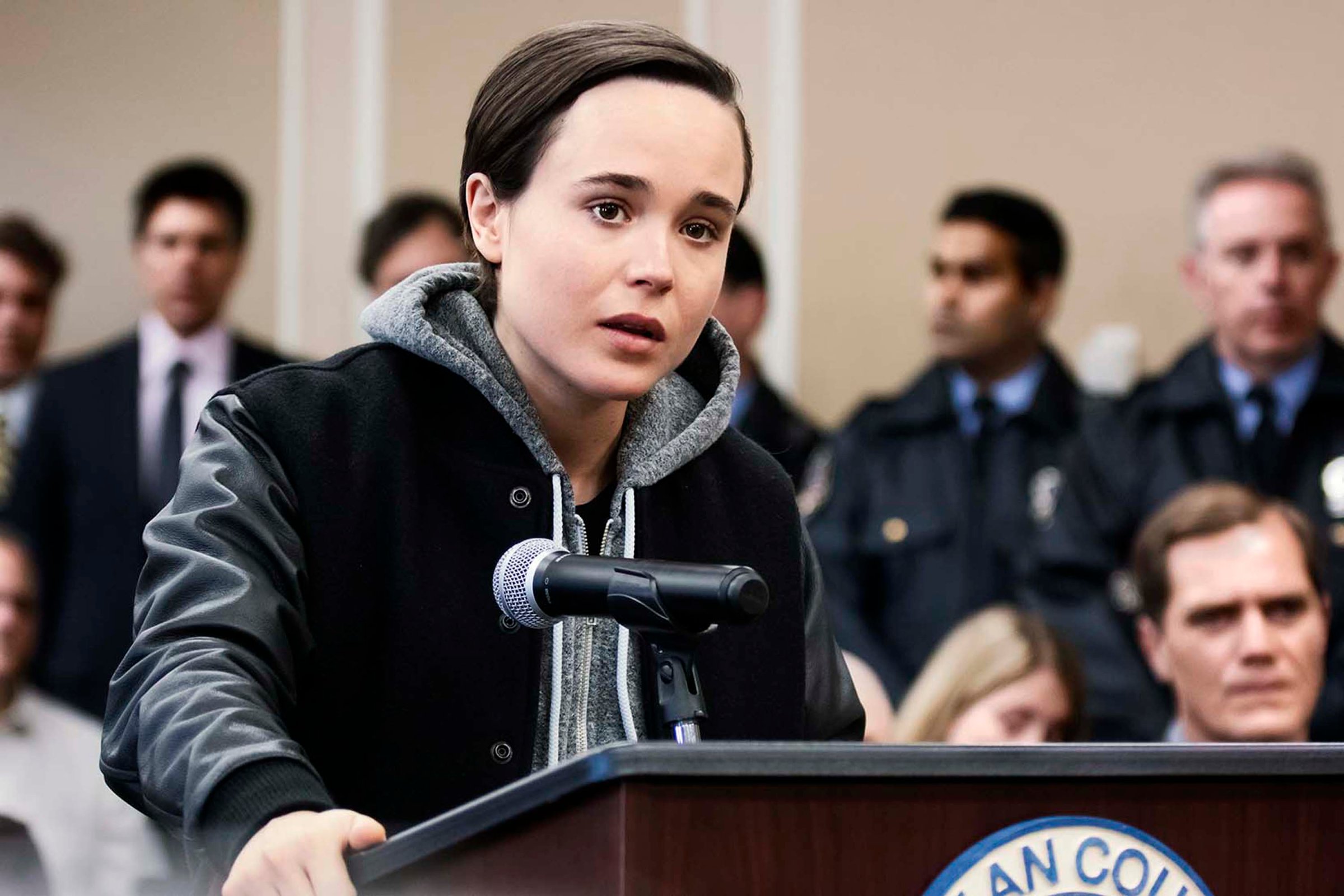
Yes, Ellen Page is taking on a still contentious issue–the right to same-sex marriage–in her first big role since coming out as a lesbian 18 months ago. And yes, that could potentially redefine a career that has so far been built on her image as an edgy wisecracker. She’s O.K. with that. Just don’t call her brave.
“That’s borderline offensive,” Page says. The offense is partly the implied stigma to lesbian, gay, bisexual, transgender and queer people (“I’m never going to be considered brave for playing a straight person, nor should I”) and partly the distraction from the real-life people whose story is told in Freeheld, out Oct. 2 in limited release. “Laurel and Stacie are far more brave than I’ll ever be in my life.”
Laurel is Laurel Hester, a New Jersey state-police lieutenant (played by Julianne Moore) who made national news in 2005 after she became terminally ill and appealed to pass her pension benefits to her longtime partner Stacie Andree (Page). Onscreen, the pair fall in love in endearing fits and starts, then fight the state fiercely. (The film’s title refers to Ocean County’s Board of Chosen Freeholders, the legislative body that denied Hester’s request.) As part of her preparation to play auto mechanic Andree, Page, 28, practiced rotating tires at a garage and repeatedly watched a 2007 documentary about Hester and Andree, also called Freeheld, which won an Academy Award for Best Documentary Short Subject. “I felt connected to it,” Page says. “It had entered me on an emotional level.”
Page was in the room when the first Freeheld won its Oscar in 2008, the same year she was a Best Actress nominee for her role as Juno’s smart-ass pregnant teen heroine. Shortly after, producers sent her a copy of the documentary, hoping to recruit her for an adaptation. “Just watching the trailer to the documentary, I was weeping,” Page says. She signed on, but it took six years to get the project funded. “Getting financing independently for a movie that stars two women is tricky,” Page says. Films focused on gay characters are apparently even trickier.
A decade after Brokeback Mountain became a breakout hit, nonstraight characters remain rare in Hollywood. A recent GLAAD study found that of the 114 studio films released last year, just 20 featured LGBT characters and only seven gave those characters more than 10 minutes of screen time. Rarer still: Hester and Andree aren’t the worldly, wealthy sophisticates seen in many gay cinematic narratives. They’re solidly working class, which partly explains why they fight so hard for what’s theirs–and why their story took so long to get onscreen.
For her part, Page describes the years that Freeheld languished–during which she worked in indies like The East and box-office hits like Inception–as deeply sad for her. She was wrestling with the guilt she felt for staying closeted. “I didn’t feel motivated. I was just depressed. Going to meetings or trying to push for things–it was this little flame that was barely flickering. The moment I came out, I felt every cell in my body transform. I was happier than I ever could have imagined.”
Though she didn’t come out because of Freeheld–“it was my own internal journey, for the most part”–Page views her decision as a social responsibility. “Seeing Stacie and Laurel’s story and knowing you’re going to tell it, you think, There’s no way you cannot be an out gay person if you make this film.”
When Page agreed to star in Freeheld, same-sex marriage equality was still an unsettled issue. Now the film arrives just months after the Supreme Court affirmed the right nationwide. So does that make the story an afterthought? Page dismisses that question as “pure silliness” and cites hurdles remaining for the gay-rights movement. “We’re seeing tons of backlash. The anti-gay rhetoric of the right is turning into ‘Gays are actually bigoted toward us because we’re not getting to express religious freedom,'” Page says. “I’m an atheist, so I just have no time for it. But that will be the next challenge.”
So, too, will be finding projects with the personal and political overtones that speak to a newly out actor. Page has finished filming two new movies, including Into the Forest, a postapocalyptic thriller that will debut at the Toronto International Film Festival in September. Neither one touches on gay issues. But she plans to develop her own projects and is working on a Vice series in which she’ll document gay culture abroad. Citing the success of Orange Is the New Black, she says, “People want diversity. They want it. Whether they consciously know it or not.”
Providing that diversity is giving Page motivation that’s long been missing. “The context of [Freeheld] is so deeply tragic, but for me there was a deep, deep, deep sense of peace on set that I had not felt since I was a teenager and first having fortunate moments in film. If I played gay characters for the rest of my career, I’d be thrilled.”
–DANIEL D’ADDARIO
More Must-Reads from TIME
- Donald Trump Is TIME's 2024 Person of the Year
- Why We Chose Trump as Person of the Year
- Is Intermittent Fasting Good or Bad for You?
- The 100 Must-Read Books of 2024
- The 20 Best Christmas TV Episodes
- Column: If Optimism Feels Ridiculous Now, Try Hope
- The Future of Climate Action Is Trade Policy
- Merle Bombardieri Is Helping People Make the Baby Decision
Contact us at letters@time.com